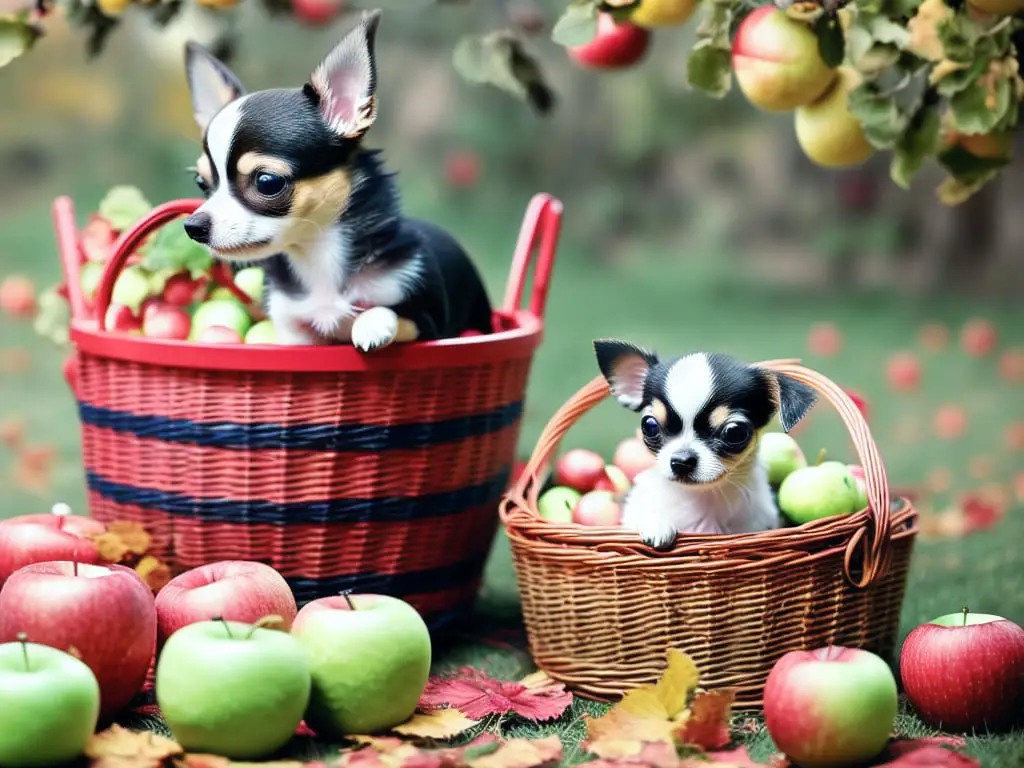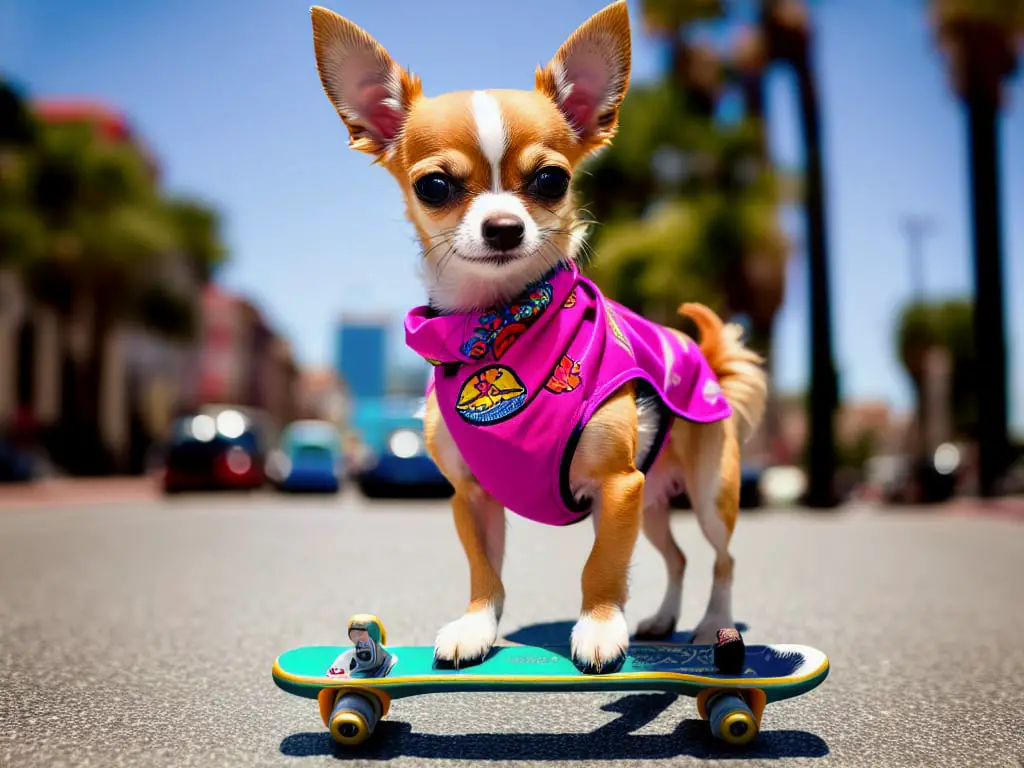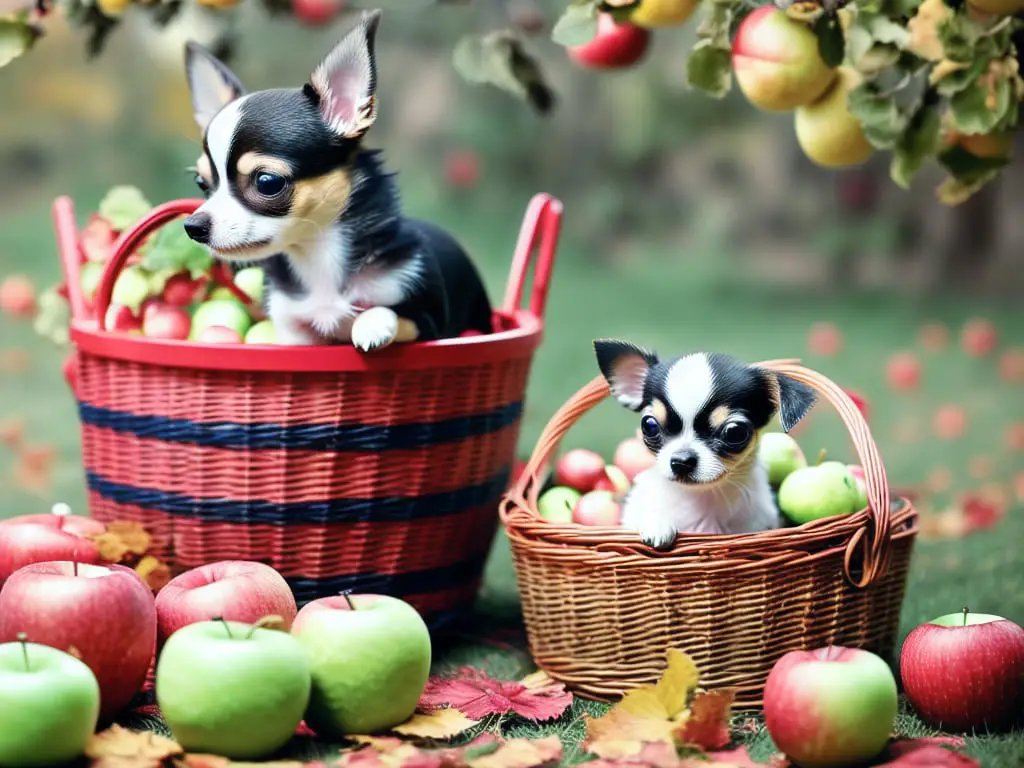The Chihuahua is the smallest dog in the world and comes from Mexico. They have a big personality and are very lively and confident. There are two types of coats they can have: smooth or long. Even though they are small, they are good at protecting their loved ones. Chihuahua Puppy can be shy initially, but once they warm up to you, they are loyal and love to cuddle. Just be careful because they can be protective of their personal space. If you want to learn more about Chihuahuas and why they make excellent pets, keep reading!
Table of Contents
- 1 Understanding the Characteristics and Temperament of Chihuahua Puppies
- 2 Caring for Your Chihuahua Puppy: Feeding, Grooming, and Training Tips
- 3 Ensuring the Health and Well-being of Your Chihuahua Puppy: Vaccinations and Health Care
- 4 Exploring Chihuahua Puppy Coat Colors, Patterns, and Grooming Needs
- 5 Choosing a Reliable Chihuahua Breeder and Joining Breed Organizations
- 6 Embracing the Joy of Owning a Chihuahua Puppy
- 7 Related posts:
- 8 Chihuahua Temperament: Facts and Misconceptions
- 9 Discover Black Chihuahua Breeds: Pictures, Info & More!
- 10 Chihuahua Dog Breed: Facts, Pictures & Health Care
Understanding the Characteristics and Temperament of Chihuahua Puppies
Loyal and Affectionate Companions
Chihuahuas are known for their loyalty and affection towards their owners. These tiny dogs form strong bonds with their human companions and enjoy being in their presence. They often seek out attention, love cuddling, and will happily curl up on your lap for a cozy snuggle session. Chihuahua puppies thrive on the love and affection they receive from their owners, making them excellent companions for those seeking a loyal and devoted pet.

Not Ideal for Families with Young Children
Due to their small size, Chihuahuas may not be the best fit for families with young children. While these dogs can be loving towards all family members, they can also be delicate and easily injured by rough handling or accidental falls. Supervising interactions between Chihuahua puppies and young children is essential to ensure both parties remain safe. Families with older children who understand how to handle small dogs gently can provide a suitable environment for a Chihuahua puppy.
Strong Prey Drive
Chihuahuas are instinctive to chase small animals due to their strong prey drive. Squirrels, birds, or even household pets like cats may trigger this instinct in your Chihuahua puppy. Keeping them on a leash or in a securely fenced area outside is essential to prevent them from chasing after animals or getting into potentially dangerous situations. Proper training can help manage this behavior, teaching your Chihuahua puppy appropriate boundaries.
Socialization is Crucial
Socializing Chihuahua puppies early is vital for their development and overall behavior. Introducing them to various people, animals, sights, sounds, and environments helps them become well-adjusted adult dogs. By positively exposing your Chihuahua puppy to different experiences, you can help them develop confidence and reduce the likelihood of fear-based behaviors.

Caring for Your Chihuahua Puppy: Feeding, Grooming, and Training Tips
Balanced Diet for a Healthy Chihuahua Puppy
To ensure your Chihuahua puppy grows strong and healthy, providing them with a balanced diet specifically formulated for small breeds is essential. Look for high-quality commercial dog food that meets their nutritional needs. Opt for options that contain real meat as the main ingredient and avoid fillers or artificial additives.
In addition to commercial dog food, you can supplement your Chihuahua puppy’s diet with small portions of lean meats like chicken or turkey. This will give them an extra protein boost. However, be cautious about feeding them table scraps or excessive treats, as this can lead to weight gain and other health issues.
| Age (weeks) | Weight (lbs) | Height (inches) |
|---|---|---|
| 0 | 0.5 – 1 | 2 – 3 |
| 1 | 1 – 2 | 3 – 4 |
| 2 | 2 – 3 | 4 – 5 |
| 3 | 3 – 4 | 5 – 6 |
| 4 | 4 – 5 | 6 – 7 |
| 5 | 5 – 6 | 7 – 8 |
| 6 | 6 – 7 | 8 – 9 |
| 7 | 7 – 8 | 9 – 10 |
| 8 | 8 – 9 | 10 – 11 |
| 9 | 9 – 10 | 11 – 12 |
| 10 | 10 – 11 | 12 – 13 |
| 11 | 11 – 12 | 13 – 14 |
| 12 | 12 – 13 | 14 – 15 |
Regular Grooming for a Lustrous Coat
Chihuahuas have a short coat that requires regular grooming to keep it healthy and shiny. Brush their skin at least once weekly using a soft-bristle brush or grooming mitt. This helps remove loose hair, prevents matting, and stimulates blood circulation.

Bathing your Chihuahua puppy every 2-3 months is usually sufficient unless they get dirty or smelly. Use a mild dog shampoo designed for puppies to avoid irritating their sensitive skin.
Don’t forget about dental care! Brush your Chihuahua puppy’s teeth regularly using a toothbrush and toothpaste for dogs. This helps prevent plaque buildup and maintains good oral hygiene.
Positive Reinforcement Training Methods
Chihuahuas are intelligent little dogs who respond well to positive reinforcement training methods. Use rewards such as treats, praise, and playtime when teaching them new commands or tricks. Avoid harsh punishments or yelling, which can cause fear or anxiety in these sensitive pups.
Start with basic obedience training commands like “sit,” “stay,” and “come.” Be patient and consistent with your training sessions, keeping them short and engaging.
Ensuring the Health and Well-being of Your Chihuahua Puppy: Vaccinations and Health Care
Regular Veterinary Check-ups
Regular veterinary check-ups are essential to monitor your chihuahua puppy’s health. These visits allow the vet to assess your puppy’s overall well-being, detect potential health issues early on, and provide necessary treatments or preventive measures. During these check-ups, the vet will examine your puppy’s vital signs, weight, coat condition, and overall physical development.

Vaccinations for Disease Prevention
Vaccinations protect your chihuahua puppy from common diseases such as parvovirus and distemper. These vaccinations stimulate their immune system to fight off harmful pathogens. Following the recommended vaccination schedule your veterinarian provides is essential to ensure that your puppy receives all necessary shots at the right time.
Dental Care for Chihuahuas
Dental issues can be prevalent in smaller breeds like chihuahuas. Regular dental care is essential to maintain good oral hygiene for your puppy. Brushing their teeth with dog-friendly toothpaste and providing appropriate chew toys can help prevent plaque buildup and gum disease. Incorporating dental treats into their diet can contribute to healthier teeth and gums.
Neutering or Spaying Benefits
Neutering or spaying your chihuahua puppy helps control the pet population and offers several health benefits. For males, neutering reduces the risk of testicular cancer and specific prostate problems. Spaying females eliminates the possibility of uterine infections and dramatically reduces the chances of mammary tumors later in life. Please consult with your veterinarian about when it is appropriate to have this procedure done for your chihuahua puppy.

Ensuring optimal health for your chihuahua puppy involves more than just regular veterinary check-ups, vaccinations, dental care, and spaying/neutering.
Exploring Chihuahua Puppy Coat Colors, Patterns, and Grooming Needs
Chihuahua Puppy Coat Colors
Chihuahuas come in various coat colors, from solid black or white to different combinations like fawn, chocolate, and sable. These little pups can have coats that are a single color or have markings such as spots or patches. Some standard coat colors you may come across in chihuahua puppies include:
- Black: A sleek and elegant color that gives chihuahuas a classic look.
- White: This is a pure and pristine coat color often seen in these adorable dogs.
- Fawn: A light brown shade that ranges from pale to rich tones.
- Chocolate: A deep brown color reminiscent of delicious chocolate treats.
- Sable: A combination of dark and light hairs that create a stunning effect.
Unique Coat Patterns
In addition to their varied coat colors, chihuahuas can exhibit unique fur patterns. Two unique patterns are merle and brindle:
- Merle: This pattern creates irregular patches of lighter or darker shades within the base coat color. It gives each Chihuahua a distinctive appearance that sets them apart from others.
- Brindle: With this pattern, the base coat color is streaked with darker stripes. It adds an interesting texture to the fur and makes each Chihuahua’s coat unique.

Choosing a Reliable Chihuahua Breeder and Joining Breed Organizations
Research reputable breeders who prioritize the health and well-being of their dogs.
It’s essential to choose a reliable chihuahua breeder. Start by researching breeders in your area or online who have a reputation for prioritizing the health and well-being of their dogs. Look for transparent breeders about their breeding practices and can provide evidence of responsible care.
As you delve into your research, watch for any red flags. Avoid breeders who seem more interested in profit than the welfare of their puppies. Responsible breeders will prioritize genetic health testing to ensure that the puppies they produce are free from hereditary diseases commonly found in chihuahuas. They will also provide appropriate socialization opportunities for their puppies, ensuring they become well-adjusted companions.
Ask for health clearances and pedigrees when selecting a chihuahua puppy.
When choosing a chihuahua puppy, it’s crucial to ask the breeder for health clearances and pedigrees. Health clearances indicate that both parents have been screened for common health issues such as patellar luxation or cardiac problems. Pedigrees provide valuable information about the puppy’s lineage, allowing you to assess potential genetic risks.

A reputable breeder will gladly share this information with you and answer any questions you may have regarding the health history of the puppy’s parents. By obtaining these documents, you can decide whether a chihuahua puppy is right for your family.
Consider joining local or national breed organizations to connect with other chihuahua enthusiasts.
To fully immerse yourself in the world of chihuahuas, consider joining local or national breed organizations. These clubs bring together like-minded individuals who share a passion for this delightful breed.
Embracing the Joy of Owning a Chihuahua Puppy
Owning a Chihuahua puppy can bring a lot of happiness to your life. It’s essential to understand their behavior and take care of them properly. Feeding, grooming, and training are all critical for their well-being. Make sure to take them to the vet for vaccinations and check-ups. Chihuahua puppies come in different colors and patterns, so it’s fun to learn about them and keep them looking nice. Finding a good breeder and joining breed organizations can help you.

Remember that owning a Chihuahua puppy is a big responsibility. They need love, attention, and socialization. Spend time with your puppy to build a strong bond and have a happy life together. If you want a Chihuahua puppy, research to find a good breeder and get advice from breed organizations. Having a Chihuahua puppy is a chance to have a loving and loyal companion. Enjoy the joy they bring!
FAQs
Are Chihuahuas good with children?
Chihuahuas can be great companions for children if they are properly socialized from an early age. However, it’s important to supervise interactions between young children and small dogs to prevent any accidental harm.
How often should I groom my Chihuahua puppy?
The frequency of grooming depends on the length of your Chihuahua’s coat. Long-haired Chihuahuas may require brushing a few times a week, while short-haired Chihuahuas can benefit from weekly brushing to remove loose hair and keep their coat healthy.
What type of training works best for Chihuahua puppies?
Positive reinforcement methods, such as reward-based and clicker training, work well with Chihuahuas. They respond positively to praise, treats, and consistency in training sessions.
How much exercise do Chihuahua puppies need?
Chihuahuas are active little dogs that require daily exercise. Short walks, indoor playtime or in a secure yard, and mental stimulation through interactive toys can help meet their exercise needs.
Are Chihuahuas prone to any health issues?
Chihuahuas can be susceptible to specific health conditions, such as dental problems, patellar luxation, and heart disease. Regular veterinary check-ups and preventive care are crucial for maintaining their health and detecting potential issues early on.